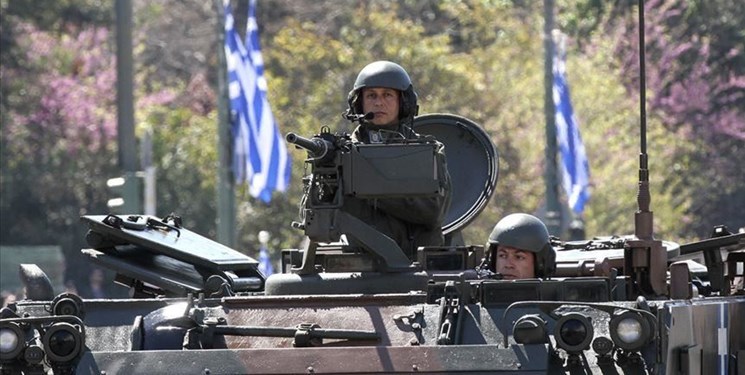Apart from the armed forces of that country, forces of foreign countries are also participating in the military exercise. France with Charles de Gaulle aircraft carrier, Rafale aircraft and E2C Hawkeye (AWACS) aircraft; the United States with F-15 fighter jets and MQ-9 Reaper drones; the Zionist regime with F-16 fighter jets, AWACS G-550 aircraft and Air refueling B-707 aircraft, Italy with Tornado fighter, Cyprus with AW139 helicopter, Slovenia with PC-9M aircraft and a number of military personnel from Austria and Canada will participate in the military exercise. Egypt, Albania, Austria, Northern Macedonia, Britain, India, Kuwait, Croatia, Morocco and Saudi Arabia have also been invited to the military exercise as observer.
The military exercise, which is considered one of the largest training areas in Europe, covers a wide range of military objectives, including: Air operations versus Integrated Air Defense System (IADS); Offensive Counter Air / Airfield Attack; Air Interdiction / Special Targets; Anti Surface Warfare, Slow Mover Protection (SLOMO); Combat Search and Rescue (CSAR); Dynamic Targeting (DT) / Strike Coordination and Reconnaissance, and High Value Airborne Asset (HVAA) Protect/Attack.
The military exercise was first conducted in the late 1980s, as a small-scale tactical level exercise, commensurate with the need for that juncture for the training in combined air operations in accordance with the Greek Air Force doctrine. Over the consequent years, the military exercise led to the decision to organize it as an annual event. In 2005, the military exercise was decentralized, therefore, the participating aircraft operated from their main bases, while planning and coordination took place at the Air Tactics Center and facilities of the School of Weapons at the Andravida Air Force Base. In November 2013, the decision was made to adopt a single basic concept, upgrade the scale of intermediate training and expand the range of operations with an aim of creating a more realistic environment with a long and intense battle rhythm, which significantly improved the training level of participants.
In the 2015 military exercise, the air force of the United States, Israel, the UAE and Italy showed more interest in participating in the exercise, becoming practically one of the most competitive military exercises in Europe and the Mediterranean region, and provided the participants with a high level of training and experience in enhancing the cooperation and skills of the air forces.
According to Greek Air Force officials, the military exercise is intended to simulate various scenarios, including fleeing surface-to-air missile strikes, attacking ground targets, search and rescue, and protecting or attacking an air target, strengthening co-operation and interoperability between armed forces of the participating countries, conducting advanced operational training in a real environment and from the challenges they face during the actual operation.
The UAE is not participating in this year’s military exercise, due to the relative improvement of the UAE relations with Turkey in recent months. The UAE participation in the military exercise last year was strongly opposed by Turkey. Greece and the UAE held separate joint exercises in the Mediterranean last year, with the Turks threatening that if the Emirati jetfighters approached Turkish marine space or around the Ouch Rais ship, which is drilling off the Greek island of Crete, they will be targeted by the Turkish Air Force because the UAE is excessively playing its role and playing with fire. For years, Turkey and the UAE have been on both sides of regional conflicts due to deeply conflicting policies. Sanctions on Qatar, imposed by a joint decision of the UAE, Saudi Arabia, Bahrain and Egypt, were one of the main differences between the two sides.
Although Turkey has not yet reacted formally to the military exercise, it has generally condemned Greek military exercises at the highest political levels in the Eastern Mediterranean waters, blaming Greece as being solely responsible for all conflicts in the Eastern Mediterranean, claiming that the exercises violate all maritime laws and the principle of good neighborliness.
Greece’s new military exercise comes as Greek officials condemn Russia’s invasion of Ukraine at a bilateral level within the European the framework of the European Union and NATO, and express support for the Ukrainian people, calling for an immediate ceasefire, withdrawal of Russian troops from Ukraine and confrontation with the current humanitarian crisis in that country. The Greek people are also opposed to any Greek participation in the war. According to an opinion poll by the Greek research institute GPO, 60.5% of Greeks believe that their country, despite its membership in NATO, should remain neutral in the ongoing war in Ukraine. Only 36.7% believe that Greece should follow the decisions of NATO and the European Union. 65% oppose sending military equipment from Greece to Ukraine. 33.9% consider the Russian president the main cause of the war. 29.7% consider Western powers (NATO, the United States and the European Union) as the cause of the war, and 33.1% believe that both Russia and Western powers are to blame.










0 Comments